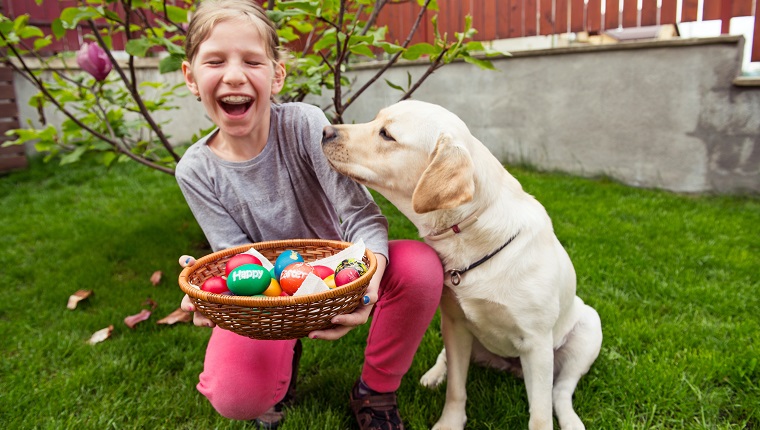Easter is on the way, and many families celebrate with food, gifts, and fun. However, the holiday can present a few dangers for our dogs.
Our pups are part of the family, and we don’t want to exclude them from the good times, but it’s important to be extra cautious and vigilant during events where there are a lot of people and distractions. Easter is no exception.
I had a conversation with Dr. Danielle Bernal, veterinarian with Wellness Natural Pet Food, to get some tips on what dog parents should watch out for on Easter.
While you’re enjoying your Easter feasting and fun, keep these safety tips in mind, and spread the word to help other families keep their dogs safe, too.
Keep The Chocolates & Candy Out Of Reach
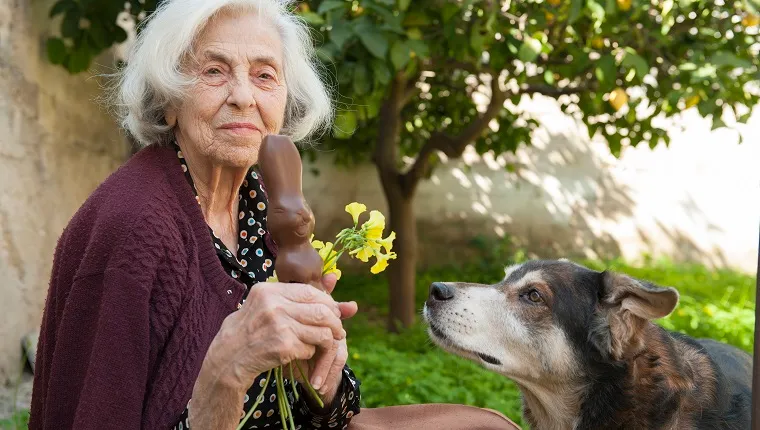
Easter baskets are often loaded with candy and chocolate bunnies. “In fact, the Pet Poison Helpline reports that calls increase nearly 200 percent during the week of Easter due to dogs eating chocolate,” says Dr. Bernal.
Little kids can sometimes drop candy on the floor or leave half-eaten sweets where dogs can get them, so make sure they know the rules and keep an eye out for any discarded candies or wrappers.
“Obviously, wrappers don’t digest like food does, and they can cause intestinal blockage in dogs,” Dr. Bernal adds.
If you plan on serving desserts, make sure they stay on the table and away from any hungry pups. Chocolate is toxic for dogs, and candy can be loaded with sugar or artificial sweeteners like xylitol, which is also toxic for canines.
Make sure your dog sticks to treats specifically for dogs only. Dr. Bernal recommends Wellness CORE Petite Treats, which are grain free and protein rich.
If Your Dog Gets Into The Chocolate
If your dog does somehow manage to sneak away with a chocolate morsel, you should watch for concerning symptoms. Contact your vet if you see signs of upset stomach or digestive issues, as well as changes in behavior.
Chocolate can have different effects on different dogs.
“If a big dog has a small bit of chocolate, the reaction will likely be milder than if a small dog eats that same amount of chocolate. So, size matters both in how large the dog is and how much chocolate is consumed,” says Dr. Bernal.
But your dog’s size and the amount of chocolate they’ve eaten aren’t the only things you should be concerned about. You also need to know what kind of chocolate your dog has eaten.
“Dark chocolate is the one you really want to avoid, as it has the ingredient theobromine in a more concentrated form than milk chocolate. Theobromine, similar to caffeine, is toxic for our furry friends. The less concentration of the toxin, the better,” adds Dr. Bernal.
Alcohol & Caffeine Are For Humans Only
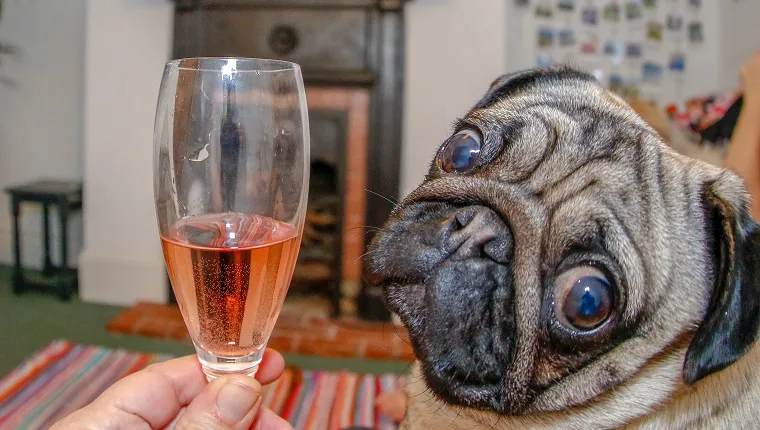
Speaking of caffeine, a lot of people drink coffee or enjoy a good glass of wine at Easter gatherings.
Any alcoholic or caffeinated beverages should be placed up high and away from dogs.
The sweetness of these drinks can be attractive to pups, but alcohol, caffeine, and the sugar or sweeteners that often accompany them can quickly lead to illness and an emergency vet visit.
Cooked Bones Are Dangerous
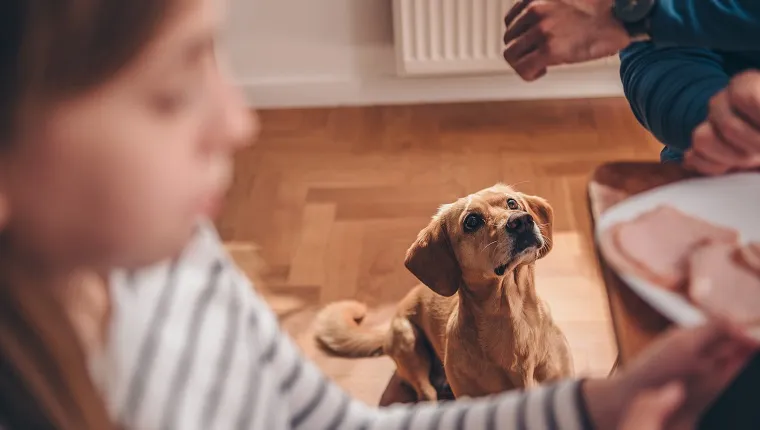
If you’re planning to serve dishes that have bones, make sure to keep them on plates and dispose of them quickly. If you have a kids’ table that’s lower to the floor, make sure your dog can’t sneak bones off of plates when kids aren’t looking.
Cooked bones can splinter into sharp pieces that cause internal damage, and these bones are dangerous choking hazards.
“While it’s fine to give your dog table scraps when it comes to most vegetables or proteins, you don’t want to give them a bone of any sort, which could splinter or get lodged in their throat,” says Dr. Bernal.
If you want to share Easter foods with your dog, stick to canine-friendly options.
Guests Can Cause Anxiety
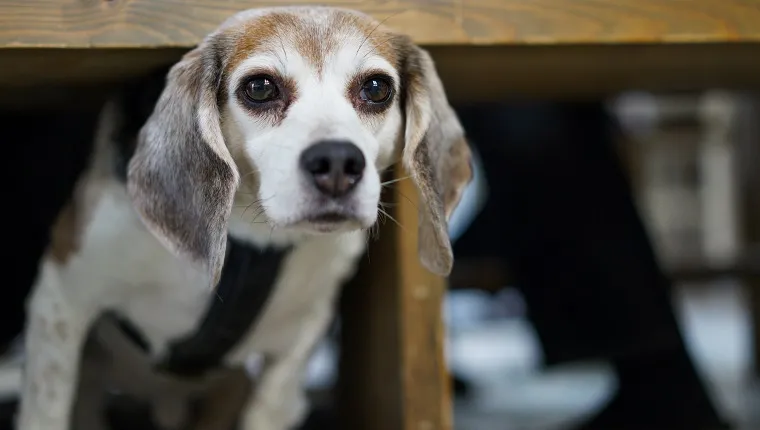
If you’re having any guests over, ringing the doorbell and going in and out, it can cause anxiety in dogs who aren’t used to all the commotion.
The strange faces and odd smells of new people entering their territory can be frightening and cause dogs to engage in nervous behavior or even bolt if the door is left open.
In the time leading up to Easter, it may be a good idea to start training your dog to be comfortable around guests.
“Keeping them calm when the doorbell rings or when new people enter the home starts with practice — teach your dog to sit or stay when guests visit and offer treats as rewards for good behavior,” says Dr. Bernal.
During your celebration, make sure your dog is secure and that doors that lead outside are always shut when not in use. Inform your guests not to let your dog out. “When guests are around the house, offer treats again as distractions and rewards for calm behavior,” adds Dr. Bernal.
If your dog is especially anxious, it may be best to keep them safe in another room with a radio or television on.
Dr. Bernal’s recommendation: “If your dog simply cannot handle the crowd, create a comfortable space in a room where they can relax. Including things like toys they love or a bed they enjoy will make them remain calm and settled. And of course, check on your pup often and make sure there is ample water and the right portion of food.”
Keep The Trash Secure
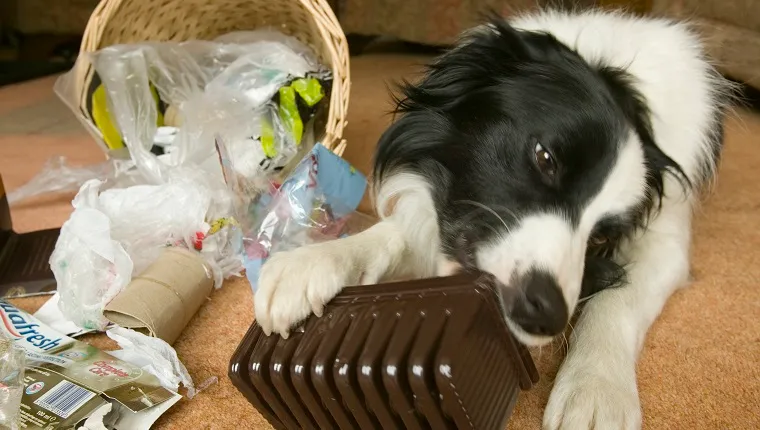
With every feast, there’s bound to be a lot of waste. The trash bin might get full of food products and interesting-smelling garbage, and that can be very tempting for dogs.
“Another thing to keep an eye out for is the plastic grass used to decorate Easter baskets. If your pooch gets into the garbage, like wrappers, the fake grass can cause intestinal blockage and upset,” says Dr. Bernal.
Make sure the trash is secure and out of reach. “Placing the garbage can under the kitchen sink or in the garage creates physical barriers that prevent canine access,” recommends Dr. Bernal.
Put something heavy on the lid if you have no other option, and tell guests to keep the trash blocked off. “There are also certain trash cans — like ones with pedals and lids — that are typically difficult for dogs to access. Those are a great idea if you have the trash in your dog’s reach,” adds Dr. Bernal.
Don’t Let The Food Out Of Sight
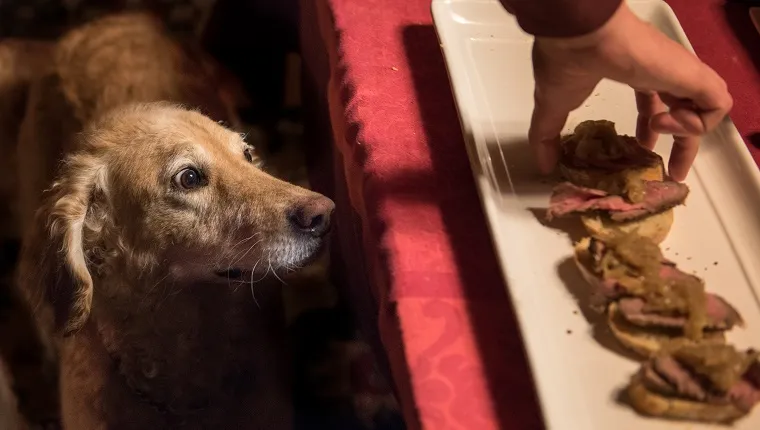
Any leftover food should be quickly put away or kept where it can’t be reached by your dog. Easter food can be very attractive to dogs, but it can also be full of things that are toxic.
Grapes and raisins, for example, are toxic to dogs, as are macadamia nuts and several other foods. Greasy, salty, and fatty foods can cause diarrhea, upset stomachs, or more severe conditions if eaten in high quantities.
If your dog does eat human foods, watch for unusual symptoms. “Look for sudden changes in behavior — if your pup is typically trotting around, socializing with guests, or wagging their tail, and they are suddenly lethargic or withdrawn, something may be wrong. If you notice a loss of appetite, repeated vomiting, or diarrhea, there also may be an issue,” says Dr. Bernal.
It’s important that you keep an eye out for these symptoms, as you know your dog best. Don’t rely on guests to point out when your dog is acting unusually. It’s your responsibility.
“Each pet parent knows their dog’s habits and mannerisms, so they will know if something is off. If you think there is a chance of illness, call or visit the vet” adds Dr. Bernal.
If you want some safer options of food to treat your dog on Easter, Dr. Bernal recommends WHIMZEES all-natural daily dental chews, which come in adorable shapes like alligators and hedgehogs that are perfect for doggy Easter basket stuffers.
Small Toys & Plastic Eggs Can Be Hazardous
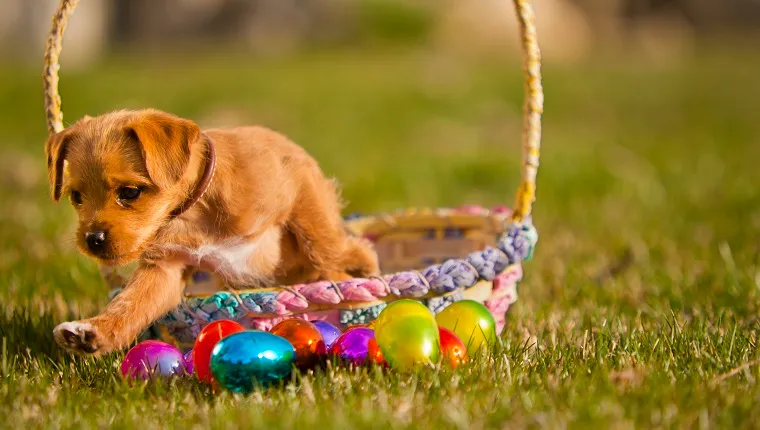
If you’re giving Easter baskets to the kids at your gathering, chances are good that they will have plastic eggs, fake plastic grass, stuffed animals, small toys, or other fun items. These items, however, may not be so fun for dogs who swallow them.
Not only are they choking hazards, but they can also break apart into sharp pieces and do internal damage, or they can cause gastrointestinal blockages.
When kids are done playing with them, put them away. If you hide plastic eggs, make sure they are all accounted for when everyone is finished searching for them.
Some dog parents like to have Easter egg hunts with their dogs, and that’s fine, so long as dogs are supervised. Dr. Bernal says:
There’s nothing more effective than keeping your dog close and joining them on the hunt. Dogs are naturally curious creatures and will likely put plastic Easter eggs in their mouths. Once your dog finds an egg, empty the contents for them to enjoy and keep the plastic shell with you. There is no reason to miss out on a fun canine Easter egg hunt, just be sure to keep an eye on the action!
Of course, you can also hide real eggs for your dog to find, too. “If you’re keen to include eggs, using real, hard-boiled eggs is completely safe,” says Dr. Bernal.
What other Easter safety tips do you have for fellow dog parents? Is your dog going to be a part of your Easter celebration? Let us know in the comments below!
